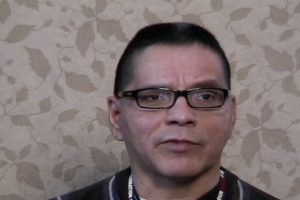Year: 2009
Location: Jasper
Profile: Cecil Cardinal came from a remote First Nations Reserve in Alberta in the 1980s, to work in an urban penal environment. Already half of his family, including his father, had suffered incarceration, but his family persevered to ensure its imprisoned members were not isolated. Cardinal describes the effects of Residential School on his depressed community and his family.
He noted that the workforce at the Calgary Correctional Centre had a class structure with former military, including British at the top. Cardinal felt racialized isolation but was determined to succeed at his chosen career. He sought union office and leadership to effect positive change. Cardinal describes his extensive union experiences in working with management, in improving health and safety practices, and fighting for democracy in the union, including in collective bargaining especially in a strike context. This was a period of government-imposed austerity measures and “rollbacks”. As a veteran union activist and Local Union Chair, Cardinal was strongly influenced by his uncle, a Cree activist and First Nations Chief who graduated from university and authored two books – in spite of his Residential School traumatic experience. Cardinal takes great pride in his dedication and service to the union fraternity, and his contributions to improving the growth and organizational structure of AUPE.
Keywords: First Nations Radicalism; Government of Alberta ‘Rollbacks’; Health and Safety – Penal Environment; Métis – Life and Welfare; Penal Culture; Pensions; Residential Schools – Impact; Trade Union Activism; Union/Management Relations
Transcript: Download PDF
See Also: Alberta Union of Provincial Employees; Indigenous Labour in Alberta; Systemic Racism in Alberta

